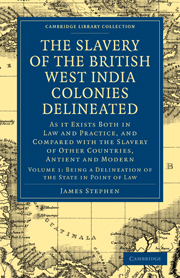 The Slavery of the British West India Colonies Delineated
The Slavery of the British West India Colonies Delineated Book contents
- Frontmatter
- PREFACE
- Contents
- PRELIMINARY CHAPTER: Of the Necessity and Importance of describing the State in question, and the general Plan of the Work
- BOOK I OF THE SLAVERY OF OUR COLONIES CONSIDERED AS A LEGAL INSTITUTION
- Appendix, No. 1
- Appendix, No. II
- Appendix, No. III
- Appendix, No. IV
- Appendix, No. V
- Frontmatter
- PREFACE
- Contents
- PRELIMINARY CHAPTER: Of the Necessity and Importance of describing the State in question, and the general Plan of the Work
- BOOK I OF THE SLAVERY OF OUR COLONIES CONSIDERED AS A LEGAL INSTITUTION
- Appendix, No. 1
- Appendix, No. II
- Appendix, No. III
- Appendix, No. IV
- Appendix, No. V
Summary
As the slave trade is yet prosecuted by other countries, and I am not one of those who think its resumption by our own impossible, while colonial influence is powerful enough to prevent an effectual registration, and to maintain the opprobrious slave laws of our islands, I think it not superfluous to enquire from what African sources that detestable commerce is supplied, and on a question whether its victims shall still be sold, and exiled at the master's choice, and their future offspring held in bondage, it is not immeterial to show how far even the laws and customs of that country are from warranting the practice.
I therefore give the following extracts from evidence to which no apologist of the trade can object, because it was adduced by the slave traders themselves, in support of their bad cause before a committee of the Privy Council. I the rather do so, because the report I extract from is in few hands, and not likely to be reprinted.
James Penny, Esq., an African merchant, who during eighteen years had as captain and mate of slave ships, traded to every part of the coast, had resided two years as a slave factor in Africa, and at the time of giving his evidence was one of the Liverpool petitioners, and delegates against the abolition of the slave trade, said: “There are also native slaves in this country. Three-fourths of the inhabitants are slaves—domestic slavery is very prevalent in this country—their domestic slaves are never sold except for crimes. They are tried for their crimes, and the number of slaves is so great, that the government would be afraid of committing any act of injustice for fear of a revolt.”
- Type
- Chapter
- Information
- The Slavery of the British West India Colonies DelineatedAs it Exists Both in Law and Practice, and Compared with the Slavery of Other Countries, Antient and Modern, pp. 445 - 452Publisher: Cambridge University PressPrint publication year: 2010First published in: 1824


